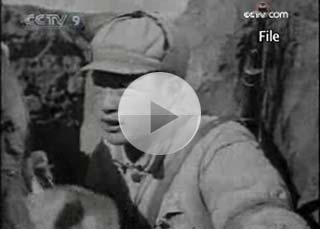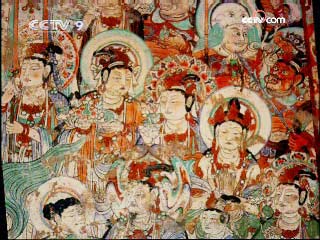------Program code: DO-090108-03504 (what's this?)
Source: CCTV.com
01-08-2009 10:25
 |
In July 1948, the film “Lights of Ten Thousand Homes” produced by the Kunlun Film Company, went on public release. It was the story of Hu Zhiqing, an employee at a small company in Shanghai, and his family. While Hu goes out to work, his wife looks after their home. His mother and younger brother come from their impoverished home village to live with them. But then prices skyrocket, and the family find they can no longer make ends meet.
 |
Hu Zhiqing loses his job, and the family finds itself in even greater difficulties. In the joy and sorrow of the family, many filmgoers saw their own real life situation.
On July the 23rd, a discussion was held at Tsinghua University, on the topic “The Tasks of Intellectuals Today”. Zhu Ziqing, head of the department of Chinese, said: “We’re unable to live like the masses, not because we’re irrational or unwilling to, but because we can’t change our habits. So I tell my students to instruct us, so that we change slowly.”
A month earlier, Zhu Ziqing had signed a joint statement issued by several professors in Peiping, voicing their opposition to United States support for Japan. Zhu was entitled to buy two subsidized bags of flour a month, but he refused because the flour was provided by the Americans as aid. With his salary in June, he could only buy about three bags of flour. His refusal to buy the American flour effectively reduced his family’s income by two fifths. Zhu was suffering from a debilitating stomach complaint, which meant his weight had dropped to less than 40 kilos.
On the day he signed the joint statement, Zhu Ziqing wrote these words in his diary: “This will mean a loss of six million yuan every month, which will have a major impact on my family. But I’ve still decided to sign. Since we oppose United States’ support for Japan, I should set a personal example.”
The discussion at Tsinghua University was the last political activity ever attended by Zhu Ziqing. A fortnight later, he died of a perforated stomach.
At the beginning of June, an egg cost 12 kilos of legal tender and half a kilo of cornflour cost 50 kilos of legal tender. One third of a metre of homespun cloth cost so much paper money of legal tender that it could extend over one kilometre. Footage from “USA Today” reveals that a telephonist in Shanghai earned the equivalent of 43 US dollars a month, which was in fact 435.6 million yuan. So heavy was this amount of money that the girl could barely lift half of it.
On August the 20th, a notice was published in the major Chinese newspapers by the National Government. It announced the issuance of gold yuan. A deadline was set for converting the existing yuan and Northeast China currency into the new currency. After the deadline it would be illegal for private individuals to keep gold, silver and foreign currency.
Dong Zhujun, the proprietor of Shanghai’s Jin Jiang Hotel, later recalled: “The government ordered that anyone who had gold, silver or American dollars and did not go to the bank and convert it into gold yuan, should be executed; moreover, the owners of shops or factories who kept more than two months’ supply in stock would also be severely punished, even executed. The government let it be known that it had special equipment for hunting out gold.
Every day the Central Bank was crowded with people wanting to convert their gold, silver or American dollars into gold yuan. On the new banknotes, a portrait of Chiang Kai-shek replaced that of Sun Yat-sen. Dong Zhujun, after converting her savings into gold yuan, continued to keep goods in stock, for fear of inflation. She recalled: “I built up stocks using gold yuan I’d borrowed from friends. But I was afraid of my secret getting out, so I covertly moved my stock somewhere else. I kept enough for a year’s sales. Every night I would prepare two account books, for fear that the tax authorities might ask to see my accounts.”
Shanghai was China’s financial centre, and whether the currency reform succeeded or not there would have an impact across the whole country. So Chiang Kai-shek sent his son Chiang Ching-kuo to Shanghai to supervise the reform.
Chiang Ching-kuo had studied in the Soviet Union. During the War of Resistance Against Japanese Aggression, he became famous for his leadership in southern Jiangxi Province. In Shanghai he recruited ten thousand young people to form the Greater Shanghai Youth Service Corps. He encouraged its members to take action against anyone who resisted the currency reform. The group was known as the “tiger-slaying corps”.
Working alongside the Shanghai police, the “tiger-slaying corps” inspected marketplaces, warehouses and docks. It was strict in enforcing the policies of price capping and of outlawing hoarding and speculation. Businessmen who were guilty of violations, were paraded through the streets.
